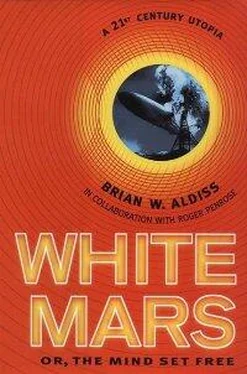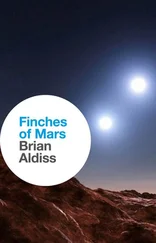Brian Aldiss - White Mars
Здесь есть возможность читать онлайн «Brian Aldiss - White Mars» весь текст электронной книги совершенно бесплатно (целиком полную версию без сокращений). В некоторых случаях можно слушать аудио, скачать через торрент в формате fb2 и присутствует краткое содержание. Год выпуска: 1999, ISBN: 1999, Издательство: Little, Brown UK, Жанр: Фантастика и фэнтези, на английском языке. Описание произведения, (предисловие) а так же отзывы посетителей доступны на портале библиотеки ЛибКат.
- Название:White Mars
- Автор:
- Издательство:Little, Brown UK
- Жанр:
- Год:1999
- ISBN:0-316-85243-0
- Рейтинг книги:5 / 5. Голосов: 1
-
Избранное:Добавить в избранное
- Отзывы:
-
Ваша оценка:
- 100
- 1
- 2
- 3
- 4
- 5
White Mars: краткое содержание, описание и аннотация
Предлагаем к чтению аннотацию, описание, краткое содержание или предисловие (зависит от того, что написал сам автор книги «White Mars»). Если вы не нашли необходимую информацию о книге — напишите в комментариях, мы постараемся отыскать её.
White Mars — читать онлайн бесплатно полную книгу (весь текст) целиком
Ниже представлен текст книги, разбитый по страницам. Система сохранения места последней прочитанной страницы, позволяет с удобством читать онлайн бесплатно книгу «White Mars», без необходимости каждый раз заново искать на чём Вы остановились. Поставьте закладку, и сможете в любой момент перейти на страницу, на которой закончили чтение.
Интервал:
Закладка:
“Do you not think that the important mother-baby bond is strengthened by the Birth Room procedures? Are we not right to encourage birthing to become a ceremony? The role of the father is enhanced by the celebration when he is again united with his wife?”
“Ah, now, there you should say husband rather than father. Men favour the husbandly role above that of a father. I will speak plainly to you. The one reason why I did not oppose the Birth Room is that the new mother is given a week’s freedom from the importunings of the male. You perhaps would not credit how many men insist on sexual union again, immediately after their wives have delivered, when their vaginas are still in a tender state. The regulations of the Birth Room protect them from that humiliating pain.”
“You must see the worst of human nature in hospital.”
“The worst and the best. We see lust, yes, and fear—and courage. The spectrum of human nature.” After a pause, she added, “We still have women who prefer to come here to hospital to give birth, and have their husbands with them.”
“But increasingly fewer as time goes by, I imagine?”
“We shall see about that.” Her lips tightened and she turned to summon a nurse.
After a while, Mary said she had a vision of what life could be. For her, Olympus the Living Being (as she phrased it) was an inspiration. Its age must surely be a guarantee of its wisdom, its eons of isolation a promoter of thought. I questioned that. “Eons of isolation? I would think they might as easily promote madness. Could you endure being alone for long?”
Her glance was humorous and questioning. “You’re really alone, Tom, aren’t you? What may be good for the vast living being may not be so good for you…”
She would like to see a society where the young were supported financially until their eighteenth birthday, in order to “find themselves’, as she put it. Only then would they be put to work for the good of the society that had nourished them.
At the other end of the scale the compulsory retirement of men and women at the age of seventy-five would be abolished. Molecular technology had reached a point where the curse of Alzheimer’s disease had been banished and both sexes lived healthily well into their early hundreds—barring accidents. It was expected that the class known as the Megarich would live for two centuries. Meditech, she said, had accomplished much of recent decades, although the time when humans lived for 500 years—an opportunity to learn true wisdom, she said—was still far in the future. Say twenty years ahead, given the peace they enjoyed on Mars. Longevity would become inheritable.
When I asked her what pleasure there would be in a lifespan of 500 years, Mary regarded me curiously.
“You tease me, Tom! You of all people, to ask that! Why, given five centuries, you would be able fully to enjoy and appreciate your own intelligence, with which you are naturally endowed. Growing out of the baser emotions, you would achieve true rationality and experience the pleasures of untroubled intellect. You would live to see the perfection of the world to which you had contributed so much. You’d become, would you not, an authority on it?”
I asked playfully, “The baser emotions? Which are they?”
As she leaned towards me to fit a light harness on my head, I caught a breath of her perfume. It surprised me.
“I don’t mean love, if that’s what you imply. Love can be ennobling. You pay too little heed to your emotional needs, Tom, do you understand?” Her deep blue eyes looked into mine.
While this discussion was taking place, the nurse was busy securing a cable to my wrist, making sure that it fitted comfortably where a tiny needle entered a vein. The other end of the cable ran to a computer console where a technician sat, his back to me. It in turn was linked with the nanotank.
“What is happening in surgical advance,” Mary was saying, “is essentially in line with your reforming principles. The technology has developed because of a gradual change in public attitudes. Notably, the dissociation of the acceptance of pain from surgery, which began with the discovery of ether anesthesia halfway through the nineteenth century. You, similarly, wish to separate the association of aggression from society, if I understand you aright.”
Before I could agree or disagree Mary rushed on to say that, as we talked, the computer was analysing the findings of the nanobots that had penetrated my system to check on the concentration of salts, sugars and ATP in the renegade cells of my brain—to, in short, perform a biopsy. The quantputer would order them to redirect the energies of malignant cells, or else to eliminate them.
“So the words pain and knife no longer—” I began. But a curious light was streaming in from I knew not where. I could not trace its source. Perhaps it was a flower, temporarily obscuring my view, as if I were a bee entering it for honey, for pollen, burrowing, burrowing, among the white waves of petals, endless white waves, festive but somehow deadly. With them, a dull scent, an unreal buzzing, the two of them interfused.
As if new senses had roused themselves … In the middle of them, a dull orange-tinted stain that moved, weeping through puny mouths as it sucked its way onward. But the holy rollers were pressing forward, extinguishing it to the sound of—sound of what? Trumpets? Honey? Geraniums? It was so fast I could not tell.
Then the light and sound were gone, only the endlessness of white waves remaining, churning over in a great ocean of confused thought. Antonia’s face? Her nearness? Mary’s lips, eyes? A sense of great loss…
“—spring to mind,” I finished. I felt as weak as if I had been away on a long swim. I could hardly focus on those violet-coloured eyes looking into mine.
“It’s all over,” said Mary Fangold, kindly, stroking my hand. The nanobots have removed your tumour. Now you will be well again. But you must rest awhile. I have a neat little ward waiting for you, next to my apartment.”
She came to me quietly at the first hour of the night, when the sigh of air circulation fell to a whisper. Her lips had been reddened. Her hair lay about her shoulders. Her pale breasts showed through a semi-transparent nightdress. She stood by my bedside, asking if I slept, knowing well the answer.
“Time for a little physiotherapy,” she murmured.
I sat up. “Come in with me, Mary.”
Slipping her garment from her body, she stood there naked. I kissed the bush of dark hair on her mons veneris, and pulled her into the bed. There we were in joy, all night, our limbs interlocked, hers and mine. At times it seemed to us that we were back on the great fecund Earth, rolling on its course with its ever changing mantle of blue skies and cloud and its restless oceans.
I remained in hospital for a week, indifferent to what was happening elsewhere. Every night, at the first hour, Mary came to me. We sated ourselves with each other. By day she was again the rational, professional person I had known until then, until the revelation of her lovely body.
During my recuperation period, Cang Hai visited me, accompanied by her precocious child, Alpha. And many other visitors, Youssef, Choihosla among them.
On one visit, finding that I looked perfectly well, Cang Hai ventured to ask me why it was that my late wife had not undergone nanosurgery for her cancer. I was mortified to feel that I had ceased, or almost ceased, to mourn the death of Antonia.
“My distrust of religion springs in part from this. Antonia was a Christian Scientist all her life. She was brought up in her parents’ creed. She held that her cancer could be healed by prayer. Nothing would persuade her otherwise.
“I could not force her,” I said. “She had every right to her beliefs, however fatal.”
Читать дальшеИнтервал:
Закладка:
Похожие книги на «White Mars»
Представляем Вашему вниманию похожие книги на «White Mars» списком для выбора. Мы отобрали схожую по названию и смыслу литературу в надежде предоставить читателям больше вариантов отыскать новые, интересные, ещё непрочитанные произведения.
Обсуждение, отзывы о книге «White Mars» и просто собственные мнения читателей. Оставьте ваши комментарии, напишите, что Вы думаете о произведении, его смысле или главных героях. Укажите что конкретно понравилось, а что нет, и почему Вы так считаете.










